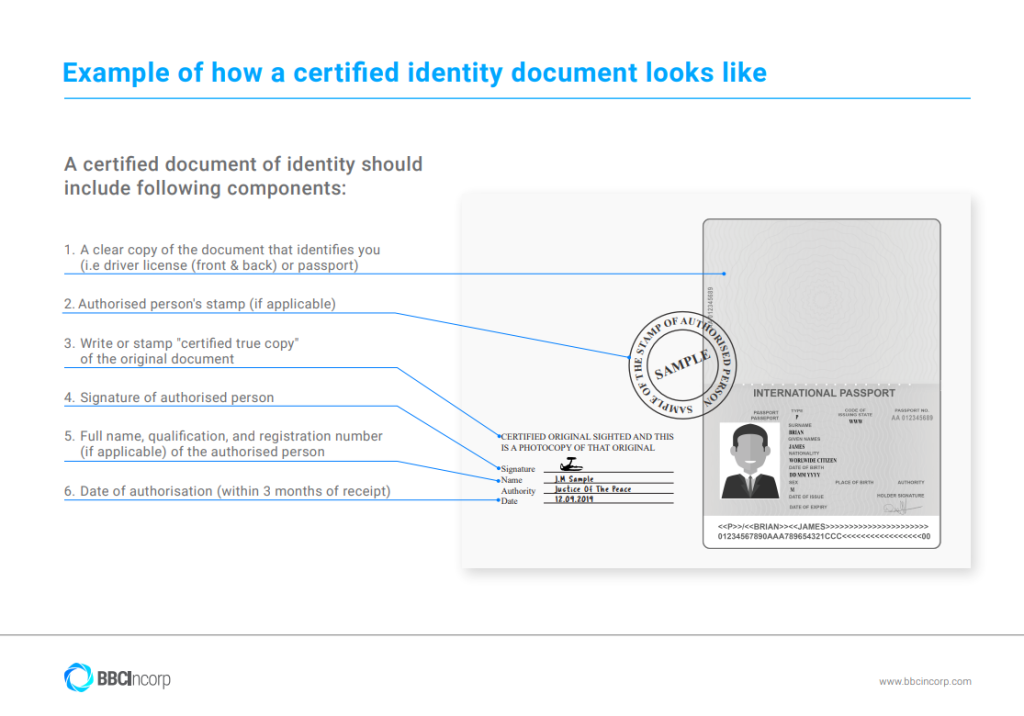
Whether you’ve been running your business in Hong Kong for years or just planning to incorporate it here, you’ve probably heard the term “certified true copy”. This document is typically required when undertaking tasks such as opening a business bank account, applying for a loan, or engaging in property transactions.
Today’s article will explain what certified true copies are, why they matter, how to obtain them, and more on these essential documents for your Hong Kong business.
What is a certified true copy in Hong Kong?
A Certified True Copy is a document that has been officially verified as an accurate reproduction of the original. To achieve this certification, a qualified professional must thoroughly examine the copy and confirm its accuracy with the original document.
It should be noted that this document is also commonly referred to as a “certified copy” or “true copy“.
External parties often need important records to conduct business with your organization. Since they can’t keep the original documents, they rely on certified true copies as substitutes. These copies are retained in their database for verification and potential future reference.
Is a notarized copy the same as a certified true copy?
No, getting a copy notarized is not the same as having it certified. While both processes aim to establish the legitimacy of a document, they serve different purposes.
Certification focuses on confirming the accuracy of a copy in comparison to the original. This process is typically carried out by a professional, often someone with legal or official authority.
Meanwhile, notarization verifies both the authenticity of the document and the identity of the individual signing it. This task is performed by a notary public, or a government-appointed public officer.
Below are some common instances where a Hong Kong certified true copy is needed:
Setting up a corporate bank account
Bank service providers and financial institutions in Hong Kong prioritize the legitimacy of businesses. For that reason, they often request certified true and correct copies of essential documents to verify the accuracy of the information provided.
Property transactions
During property dealings, especially those involving significant financial transactions, examining certified true copies is a crucial security measure. They play a vital role in confirming essential paperwork related to property purchase, sale, or transfer.
Applying for business loans
Loan providers commonly request certified true copies of pertinent documentation. This helps them evaluate the credibility and financial standing of a business seeking loans, assessing the risk associated with the involved entity.
Immigration and visa applications
Authorities often require the submission of certified true copies of passports, educational certificates, or employment records. This is a standard part of the application process to ensure document authenticity.
Legal proceedings
Certified copies not only verify proofs but also streamline processes efficiently. For instance, in a dispute over property ownership, presenting a certified true copy of the title deed can expedite the resolution process.
What kind of certified copies may be required for bank account opening in Hong Kong?
When opening your company’s bank account, you may have to submit copies of the following documents:
- Certificate of Incorporation
- Articles of Association
- Business Registration Certificate
- Identification documents such as your passport or national ID
- Proof of address (e.g. utility bills)
- Resolution of the Board of Directors
- Power of Attorney
- And so forth.
These legal copies affirm the authenticity and accuracy of the provided documents. This allows the bank service provider to move forward with the process of setting up an account for your company.
How long are the certified copies valid for?
Legally, certified true copies do not have an expiration date, but their validity is generally tied to that of the original document.
For instance, documents like birth certificates or diplomas are considered valid indefinitely. However, for documents like passports or driver’s licenses, the certified true copy is valid only until the expiration date of the original document.
Please note that certified true copies are typically accepted within a limited timeframe, often ranging from three to six months after the certification date. Given this relatively short duration, it’s advisable to obtain the documents when you are close to submitting them to the relevant authorities. In other words, avoid getting certified true copies too far in advance.
What is the format of the certified true copy?
The format of a certified copy is determined by the professional who is verifying it. To ensure that the document’s format complies with any specific requirements from the requesting party, it is advisable to stay in contact with them throughout the process.
A typical certified copy should include the following information:
Certification statement
This should be a clear statement by the certifying authority affirming that the certified copy is a true and correct reproduction of the original document (e.g. “I confirm that this is a true copy of the original”, or similar to that extent)
Certifying authority information
This section encompasses details about the person or entity providing the certification, including their name, professional title, contact information, and, if applicable, their professional license or registration number.
Date of certification
The date of certification indicates the time point on which the certification was performed. If there are later updates to the former document, this date serves as a reference point to track when the certified copy was generated in response to any modifications.
Signature and printed name of the Certifying Authority
The document must include the signature from the certifier to signify their recognition of the copy as an accurate reproduction of the original. Some certifying authorities may use an official seal or stamp to further authenticate the copy as well.
Identification of the original document
In this section, there should be a brief description or reference to the original record being certified, including its title, date, and any relevant identifiers.
Besides the information above, you will also have to specify the number of pages in the original document. Additionally, keep in mind that certification statements are expected to be written in either Chinese or English. The government and financial institutions generally do not acknowledge statements in other languages.
Don’t hesitate to reach out to the requesting entity for any additional requirements regarding the certified true copy. If you are in the process of opening a company bank account in Hong Kong, engage in discussions with the bank or the relevant financial institutions.
An example of a certified true copy of an identification document is provided below for your reference:

Who is qualified to certify the true copies?
Not every professional has the authority to offer certifying services. According to the Cap. 622 Companies Ordinance, individuals falling under the following categories are authorized to certify true copies in Hong Kong:
- A practicing notary public
- A practicing solicitor
- A certified public accountant (CPA).
In several particular cases, your true copies can be certified by:
- An officer of the court in Hong Kong who is authorized by law to certify documents for any judicial or other legal purpose;
- A consular officer of the non-Hong Kong company’s place of incorporation; or
- A professional company secretary practicing in Hong Kong.
Nevertheless, copies certified by these individuals mentioned above are only accepted in special cases. To ensure the legitimacy of your document, you should opt for confirmation from either a notary public, a CPA, a solicitor, or a lawyer.
Where to start searching for a competent certifier
To help you navigate the suitable certifier more easily, here are several helpful official government sites:
- The Hong Kong Institute of Certified Public Accountants (HKICPA) for a CPA
- The Hong Kong Law Society for competent solicitors near your location
- The Hong Kong Society of Notaries to find reputable notary publics.
To wrap up
In today’s article, BBCIncorp has guided you in understanding essential information about the certified true copy in Hong Kong. Certainly, these documents hold significant importance in establishing reliability during business transactions. Therefore, you should fully comprehend the requirements of the requesting party before proceeding to the next steps.
For any inquiries about engaging with business activities in Hong Kong, especially incorporating your company, don’t hesitate to get in touch with us today via service@bbcincorp.com. Timely assistance is readily available and just a message away.
Disclaimer: While BBCIncorp strives to make the information on this website as timely and accurate as possible, the information itself is for reference purposes only. You should not substitute the information provided in this article for competent legal advice. Feel free to contact BBCIncorp’s customer services for advice on your specific cases.
Industry News & Insights
Get helpful tips and info from our newsletter!
Stay in the know and be empowered with our strategic how-tos, resources, and guidelines.






